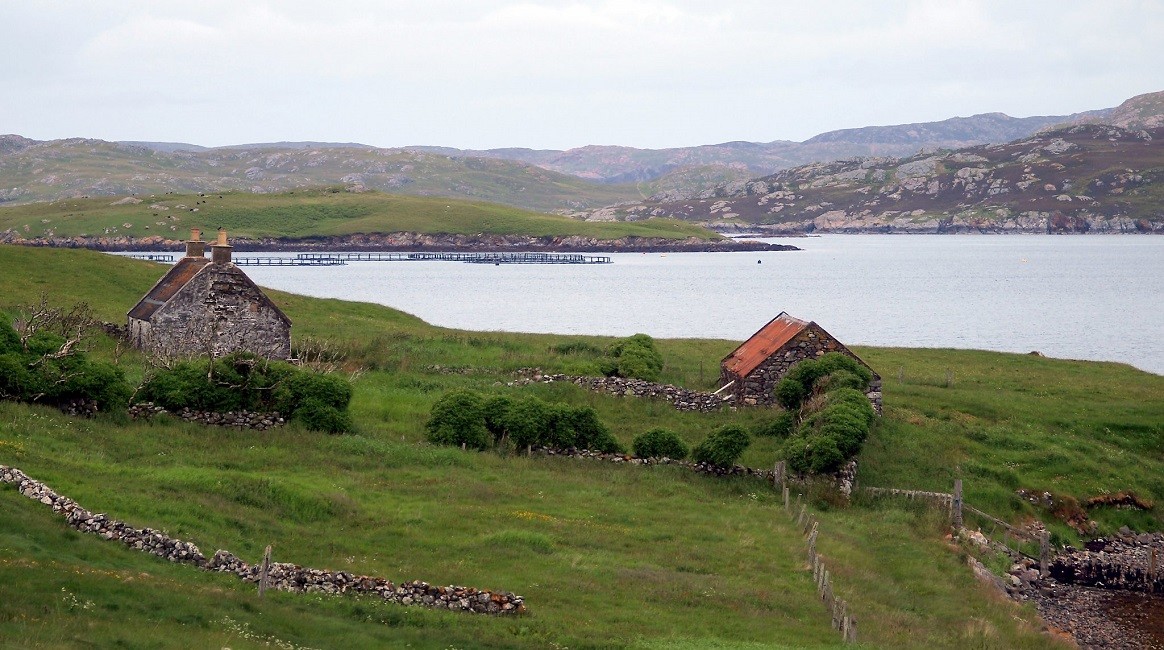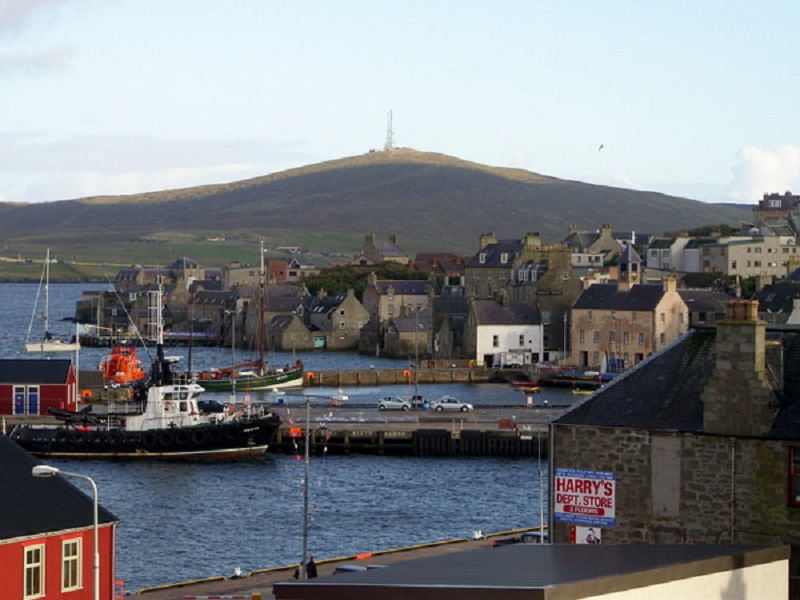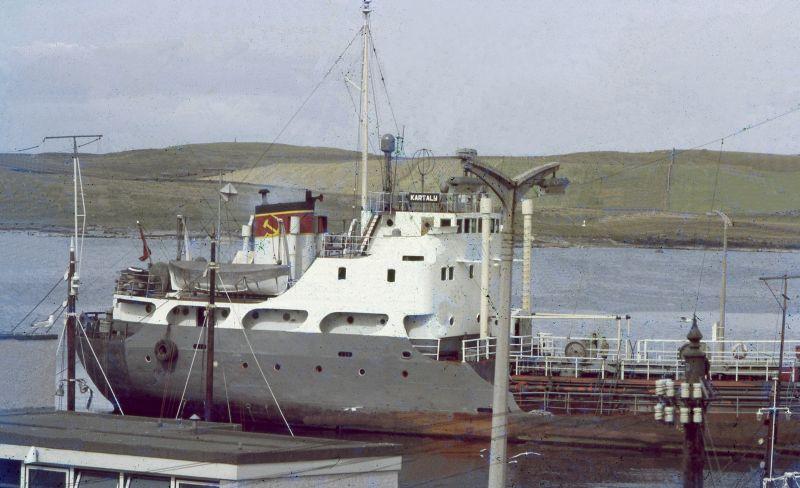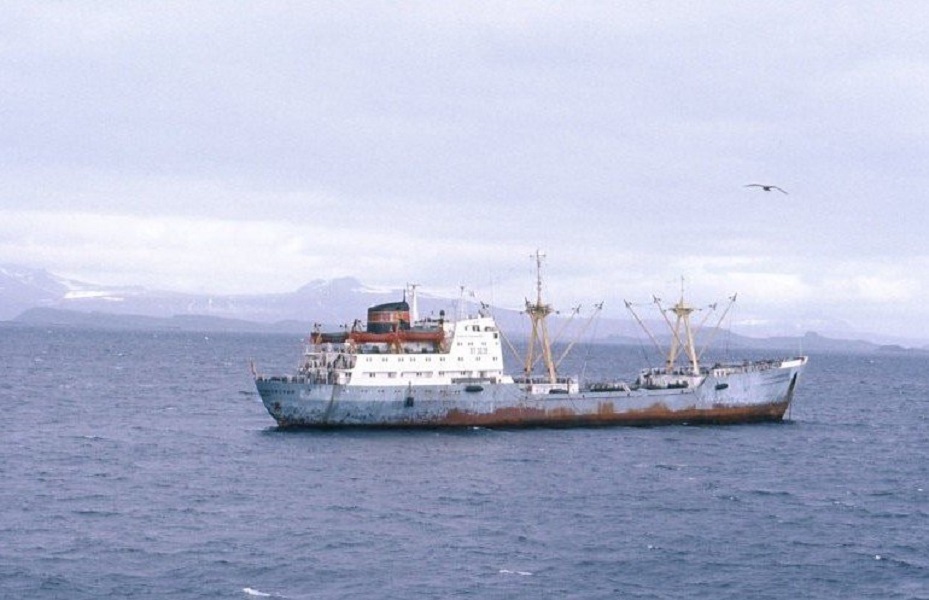The Shetland Islands are the northern-most part of the United Kingdom. A group of islands situated between the Atlantic and the North Sea, they are a windy, cold and lonely place. For one Estonian fisherman, they proved to be quite terrifying.*
The waters around the Shetland Islands are well known for the abundance of fish. The Soviet factory ship Ukrania, and its fleet of assorted trawlers and motorboats were on a voyage they had completed many times before.
The calm and clear night of 25 June 1958, however, was a night like no other. It was the night Erich Teayn, an Estonian crewman on the Ukrania, made his bid for freedom.
Using a commandeered motor-boat, one of the several accompanying the Ukrania, he powered towards the coast of the Shetland Islands. He had realised that his journey wouldn’t be easy and might even be dangerous, but he hadn’t counted on 30 of his Russian crew-mates giving chase, hoping to foil his escape. In choosing a faster boat, he managed to land slightly ahead of his pursuers, on the ragged coast near the small village of Walls, West Shetland.

Communicating in German and sign language
Teayn spent five hours trekking through bare and treeless terrain in the late daylight with the Russian crew scouring the area, looking for any trace of their former colleague. He eventually stumbled upon the cottage of a local crofter, David Fraser, and his son.
Communication was difficult as Teayn spoke no English and Fraser spoke no Estonian (nor Russian), but both had learned piecemeal German. Teayn managed to explain that he was fleeing Russian fishermen and that a search-party had been dispatched to locate him. Fraser hid the terrified Estonian well out of sight within his small cottage, cooked him a meal and alerted the police by telephone.
Meanwhile, a local coastguard, James Thomson, had been observing events with his binoculars and reported to his superiors in Lerwick, the largest town in Shetland, that a large group of Russians had come ashore, travelled several miles inland and he was baffled (and slightly annoyed) as to why. His superiors alerted the police, who had by now received Fraser’s call, and dispatched two sergeants to investigate.
At the same time, the (all non-English speaking) Russians were trying to obtain information from local residents as to Teayn’s whereabouts. Dr Hepburn, the local GP, told The Guardian that two Russians had knocked on his door and tried to communicate using sign language, adding that “it took rather a long time to find out what they wanted”.
The police in Lerwick were already worried, as the parish of Wells was small and with a population of under 1,000, it was feared the Russians might start to forcibly enter and search properties.
Similarly, it was a nervous wait for Teayn and his hosts, as at one point the Russians had passed within 50 yards of Fraser’s cottage. By the time the police arrived, after a treacherous drive on poor roads, it was nearly 2 am and the Russians had given up their search and returned to their vessels. The two police sergeants arrested Teayn under the Aliens Act (he was an illegal immigrant, after all) and took him back to Lerwick, where he was placed in custody.

Russian commanders demand Teayn’s transfer to their custody
The next day, the three senior Russian commanders of the fishing fleet landed in Lerwick to demand Teayn’s transfer to their custody. The provost (a title held by the civic heads of local governments in Scotland – editor) and senior police officer were both on leave and despite their apparent politeness and friendly manner, the police refused them all access to Teayn.
By now, news of the affair had reached a concerned Home Office in London. Leader of the Liberal Party and Shetland MP, Jo Grimond, asked Home Secretary, Rab Butler, about the incident in the House of Commons; Butler said that “every consideration” would be given to Teayn’s claim for asylum and confirmed that the 30 Russians who pursued him did so illegally and had now “gone away”.
On 27 June, two days after he fled the Ukrania, it was decided that Teayn should be taken to Edinburgh to be questioned by senior immigration officials. He travelled under heavy security and spent most of the long boat ride locked in a cabin with one of the police sergeants who initially came to his rescue on the 25th.

Alerted by the Grimond’s question in the House of Commons, the national press had begun to follow the story and pictures of Teayn, hidden under a sheet, embarking and disembarking the boat were featured in newspapers and on the television news; some of those who had met the Russian search party were interviewed by the BBC.
Crowds of local residents flocked to the pier and dockside to watch the commotion. It was also at this time it transpired that Teayn had left behind a wife and young daughter in Estonia (it later emerged that his surname, inherited at birth, was Klaup).
Teayn granted asylum
Three Russian diplomats arrived on 27 June in Lerwick, Shetland, to interview the officers in charge of the fishing fleet. Despite it being made known that local officials would be happy to meet them, they declined and remained aloof. According to port officials, they even declined an offer of a berth near a jetty and preferred to anchor at a distance from the town.
Over the weekend of 28-29 June, the British government increased the diplomatic pressure by sending a formal note of protest to the Soviet Embassy in London, detailing how they took “a grave view of the action of these seamen in landing on British territory and of their subsequent conduct there. Had they apprehended by force the person for whom they were searching, a flagrant violation of the law would have occurred.”
The Soviets were asked to issue instructions to the commanders of all Soviet vessels that would be entering British waters to ensure that such an event would never reoccur.

The Soviets meanwhile tried to have Teayn extradited – but on 15 July, it was announced in a written answer to the House of Commons that their request had been refused. Two days later he was formally granted asylum by the British government and travelled by train, as a free man, to King’s Cross station in London, accompanied by Dr Jaak Taul, chairman of the Estonian Lutheran Church of Great Britain.
The decision to grant him asylum was announced in the House of Commons by an under-secretary of state from the Home Office, to much cheering and waves of order paper in delight.
Erich Teayn lived a long life in Leicester and died in the city on 14 April 2016.
* Please note that this article was first published on 9 May 2013 and lightly edited on 5 April 2022.


Really interesting article about an event that has long disappeared from mainstream memory. I do hope Erich survived and settled down. I was best man in a Shetland wedding once and I can say that in June, it is far from cold and not so windy – especially to an Estonian sailor used to Baltic winters! Ok, it’s cooler than the mainland, but in summer, there is no darkness only a twilight at night – the ‘Simmer Dim’. if it had happened in January, i would have agreed about the bleak description- it’s why there is only one valley in the Isles that has trees. The village is called Walls, not Wells see this picture. http://shetlopedia.com/File:Walls_July_2008.jpg
I think anywhere would be a lonely place if you don’t speak the language and are being chased by 30 people. Shetland has its own dialect and broad accent, so it would make it even harder. But the people are great when you get to know them! As independent as Estonians.
Enjoyed reading the article and I hope you can update us if you ever find out what happened to Erich
PS One question asked in parliament by Manny Shinwell was: ‘Is it possible that this gentleman was anxious to join the Liberal Party?’.
Thanks for your comment, Geraint! I mainly went from the newspaper descriptions at the time, who invariably say it is bare and wintery all year through!
We’re do some work on tracing Teayn (or variants thereof) and will certainly update should we find out what happened to him.
By the way, I have a copy of your book – I look forward to reading it!
I know what happened to him
For a moment I was lying in the tall grass and bramble next to Erich, behind a sea-dwarfed juniper, with the beam of oversized flashlights flaring over my head. What an exciting time in life it must have been for him.
Thanks for the story.
http://www.thisisnottingham.co.uk/day-November-18-1963/story-12221756-detail/story.html#axzz2TCUvSHQc
Thanks Sven, maybe someone in estonia House in leicester knows more? it is good to hear 5 years later he is settled and Nottingham is one of the better cities in the UK!
Check the information on 8th page, http://rahvusarhiiv.ra.ee/public/TUNA/Artiklid_Biblio/PihlauJaak_Merepogenemised_TUNA2001_2.pdf
Shows up as Erich Klaup
He was lucky! In the 70’s a Soviet naval vessel in the Atlantic near the US was met by a US naval vessel. A Lithuanian seaman, I believe Simas Kudirkas, jumped aboard the US vessel asking for asylum. The US crew handed him back at the demands of the Soviets, insisting he was a common deserter . The guy ended up doing hard labour in Siberia for a few years until from pressure by the US, embarrassed by the incident, got him released. He was allowed to immigrate to the US on the technicality that one of his grandparents had been a US resident briefly before returning to the old country, therefore he was entitled to claim citizenship via this connection. If the Russian patrol had nabbed the Estonian he’d have been shot on the spot.
My dad was his carer x